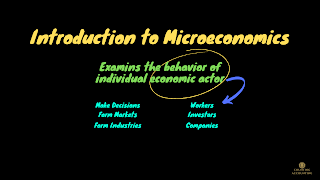In this article, we're going to discuss the subject of microeconomics. So microeconomics is concerned with studying the behavior of individual economic actors. An individual doesn't just have to mean one person it can mean families, which can mean workers or communities, investors, companies firms. So we're looking at the behavior and so how do firms make investment decisions? How do individuals decide how much peanut butter and jelly that they want to buy? How do people come together and form markets? How do companies and individuals come together and decide on the price? Are these markets going to be socially efficient? Are they going to produce the optimal level, from society's perspective, of pollution and other things? We end up with these things called externalities that we'll talk about where the free market does not produce the optimal level of some product or service.
Then also we'll look at how these individual economic actors can form industries, particularly with companies, then think about oligopolies, monopolies, and competitive markets. How these companies come together and form these industries and then how the government imposing a tax or something can affect all of these individual economic actors.
So it's going to give you some examples of different microeconomic topics so for example you might study you might look at the household level and say do households buy more peanut butter if the price of jelly decreases and so we'll talk about things such as substitutes and complements. I mean for obviously if jelly is something that naturally goes together with peanut butter in a lot of countries. We might look at the family level and say and forgetting money or things like that or even buying things, we might just think about the decision to have more or fewer children. So when we say that a family's income is increasing over time, are people going to start having fewer children, or are they going to say well now we have more income we can have more children and we can think about substitutes for children and so forth.
We can also think about the firm perspective, we can look at companies and say okay if the government were to cut taxes, let's say that the government was to say "We're going to get rid of the corporate income tax, so we're going to cut taxes" our firms going to respond by hiring more employees. Are they going to invest that money in more machinery or are they just going to keep the money as cash or what are they going to do, or they're just going to give it as a dividend to their shareholders?
So we can look at those things we can think about with consumers and how they would respond to a tax, for example, we might say if the government were to impose the tax on yachts (yacht is just a luxury boat) if they were to impose a tax on yachts how are consumers going to respond and we talked about consumers were talking about buyers, the people that would buy the yacht normally. How are they going to respond? It's going to depend is there demand for the yacht elastic or is the inelastic? We're going to talk about what all those things mean but basically, this tax can depend on what type of good it is for example if you tax milk, people might respond differently than if you tax something that's a luxury item such as a yacht.
Also, we can think about industries in general. Not just about the firms but industries and so how does the structure of let's say the agricultural industry how does that affect something such as the price of corn and we're going to talk about all these topics and a lot more in the articles to come.




